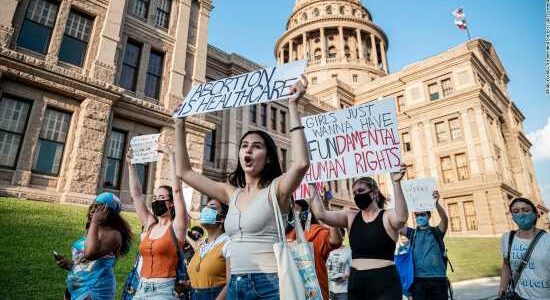
How the Texas abortion law will hit the most vulnerable
New York (CNN Business)As abortion rights advocates scramble to fight a Texas law that effectively bans abortion in the state, economists are drawing attention to the financial hardships — and subsequent economic downsides — that can occur when women’s reproductive rights are restricted.
The effects having children can have on a woman’s career and pay are well documented: While men and women with comparable qualifications and jobs earn similarly at the start of their careers, this changes when women choose to have children, after which their pay takes a hit. This is often called the “motherhood penalty.”
But the data on the effects of limited reproductive freedom are just as telling.
Being denied an abortion causes massive financial distress. And that distress is disproportionately harmful to poorer women and women of color.
The effect of being denied an abortion
Critics of the law, which prohibits abortions as early as six weeks, say the measure ignores that people who seek abortions are disproportionately poor and disproportionately people of color.
“Many people seeking abortions already face difficult financial circumstances,” said Caitlin Myers, professor of economics at Middlebury College. “About three-quarters are low-income, about half already have children, and more than half report recent disruptive life events such as losing a job or breaking up with a partner.”
An analysis of credit reports from women who took part in the Turnaway Study — which looks at the effects of denied abortions on women’s lives over multiple years — shows that not being able to terminate an unwanted pregnancy increases the amount of debt past due for 30 days or more by 78%.
It increases the instances of negative public records like bankruptcies and evictions by 81%.
“It’s an intrusion into people’s economic lives,” said Diana Greene Foster, professor in obstetrics, gynecology and reproductive sciences at University of California San Francisco, who led the Turnaway Study.
“Some women who had an abortion had children down the line, and we saw a small increase in financial problems, but by no means as much as for the women who didn’t have access to abortions,” said Sarah Miller, a professor of business economics and public policy at the University of Michigan, who analyzed the data in Foster’s study.
The majority of people who seek an abortion — 60% — are already mothers, according to Foster.
The findings are clear: Reproductive freedom and economic freedom go hand in hand, and have trickle-down effects on gender equality and equal pay.
Women were 47% of the US workforce as of August, and there is broad consensus among economists that increasing the women’s labor force participation could add billions of dollars to America’s gross domestic product, the broadest gauge of economic activity.
Making it harder to access abortions also ignores the resources a mother might have available to her, including access to contraception, savings or family support. According to Foster, “when a woman is denied an abortion, we found that in the long run she is not supported by a partner or her family.”
For example, a mother of two children might be worried that a third child would threaten the financial well-being of her existing children, Miller said.
Most women have abortions early on, in the first trimester of gestation. But the point at which women find out that they are pregnant to begin with varies. Socioeconomic status is a factor here, too, as are irregular periods.
Abortion and opportunity
Data on abortion access also shows a correlation to educational attainment.
“The legalization of abortion is estimated to have allowed women to finish their educations, enter professional occupations, increase wages, and avoid poverty,” said Myers in emailed comments.
A report from the Institute of Women’s Policy Research shows that abortion access reduces teen pregnancy, particularly for Black women, and afforded them greater opportunity to pursue further education.
On the flip side, studies show that women of color and poor women are disproportionately affected by abortion restrictions, Myers added.
“What we want from a healthy economy is for people to have access to the opportunities they want,” said Kate Bahn, interim chief economist at the Washington Center for Equitable Growth.
“And if half the population doesn’t have the freedom of that choice, it affects the dynamism of the labor market,” she added. “Autonomy is really critical for how people engage in the economy.”
Source: Read Full Article